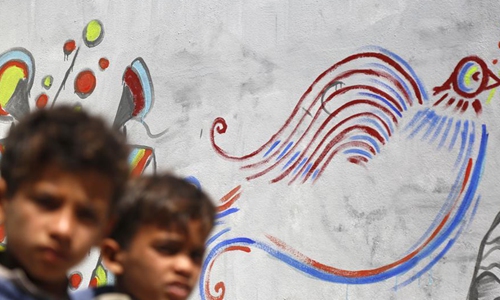Washing hands a luxury in Yemen
Few can afford basic sanitary defense that the world takes for granted
Hand-washing to combat the spread of coronavirus is the order of the day, but it is an unaffordable luxury for millions in war-ravaged Yemen where clean water is dangerously scarce.

Children walk by graffiti in a street in Sanaa, Yemen, March 3. Photo: Xinhua
Yemen's broken healthcare system has yet to register any cases of the disease, but if the pandemic does hit, the impact will be unimaginable in a country where five years of conflict has created what the United Nations calls the world's worst humanitarian crisis.
Five years after a Saudi-led military coalition intervened in Yemen to support the government against the Iran-backed Huthi rebels, some 80 percent of the population is in need of aid.
Doctors Without Borders (MSF) said it was concerned that many Yemenis have no access to clean water or soap.
"We are extremely worried," Caroline Seguin, MSF's head of programs in Yemen, Iraq and Jordan, told AFP.
"We can recommend they wash their hands, but what if they don't have anything to wash with?"
Nearly 18 million people, including 9.2 million children, do not have regular access to safe water, according to the UN's children's agency. And only one third of Yemen's population has access to piped water, UNICEF said.
Eleven-year-old Mohammed's family, who live in the rebel-controlled Hajja Province north of the capital Sanaa, are among those for whom water does not come out of a tap.
He and his sister leave their home on the back of a donkey every morning to retrieve supplies from a murky well three kilometers from their home.
"I get the donkey ready... and then head out at 7:30 am, and I keep going back and forth until 10 am," Mohammed told AFP.
The two children wait for their turn to fill up plastic canisters with a dirty hose.
Their family has no choice but to drink the contaminated water and use it for cooking.
Yemen suffered one of its worst ever outbreaks of cholera in 2017.
"Years of under-investment in public water and sanitation systems provided the foundations for this outbreak," Bismarck Swangin, UNICEF Yemen's chief of communications, told AFP.
"The risk still remains if access to water continues to be low."
Tens of thousands of people - most of them civilians - have been killed since March 2015 when the Saudi-led coalition intervened in the war that has pushed the country to the brink of famine.
The conflict, which shows no signs of abating, has crippled the country's healthcare system and paved the way for the spread of diseases.